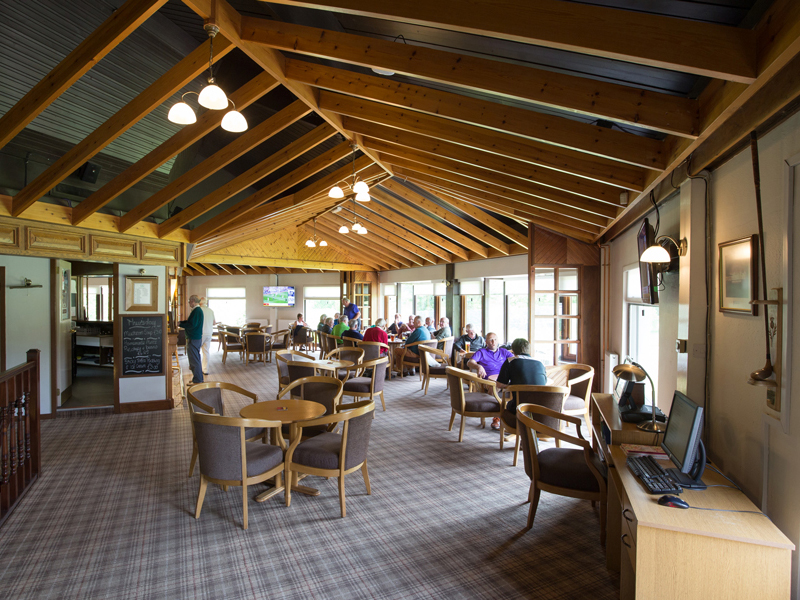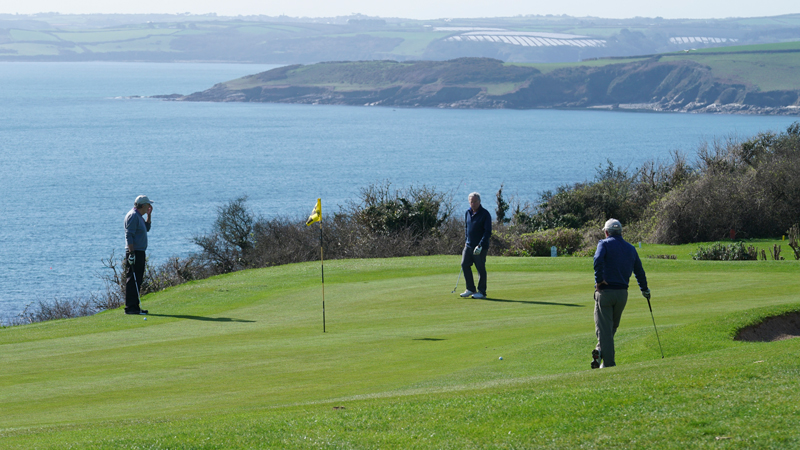Is It Better To Be A Member At A Committee-Run Club Or A Proprietary Club?
Fergus Bisset and Jeremy Ellwood discuss the merits of both


GM regulars Fergus Bisset and Jeremy Ellwood debate the relative merits of both the committee-run and the proprietary golf club.
Is It Better To Be A Member At A Committee-Run Club Or A Proprietary Club?
Committee-Run says Fergus Bisset
A committee-run golf club is a democracy.
Individuals are elected to represent the membership for a term; to hold the purse strings and make important decisions for the benefit of all members, including themselves.
The committee’s objective is not profit, purely to make the club as good as it can be.
At a proprietary club, the owners will take the members’ requirements and wishes into consideration of course, but their ultimate goal is, quite rightly, to make their business a success.
Get the Golf Monthly Newsletter
Subscribe to the Golf Monthly newsletter to stay up to date with all the latest tour news, equipment news, reviews, head-to-heads and buyer’s guides from our team of experienced experts.
The question is, would you want to join a club where the principal aim of those in charge is to maximise what each member gets for their subscription, or a club where the principal aim of those in charge is to turn a profit?
I prefer the sound of the former and that’s why I belong to a committee-run golf club.
It’s sometimes suggested the committee-run club lacks continuity when it comes to leadership and governance.
Yes, a committee tends to turnover every few years with new people taking the helm, but I see this as a positive thing.
New enthusiastic members bringing new ideas and energy to the table means the club should never become stuck in a rut.
Plus, a committee-run club can draw upon a wealth of knowledge and experience across many sectors to find a diverse selection of the correct people to represent the needs and wishes of the membership.
And the fact the membership as a whole has the final say on any fundamental issues is another benefit of the committee-run club.
The prospect of any significant changes will be put before the members at the AGM or an EGM and, if the members don’t like the proposals, they can reject them.
The people decide!
A golf club is made what it is by its members.
They are what gives a club its unique character and identity and they should be in control of its destiny.
Is It Better To Be A Member At A Committee-Run Club Or A Proprietary Club?
Proprietary says Jeremy Ellwood
Even though I'm currently a member of a committee-run club - and very happy with it - these days my feeling is that at many members’ clubs the committee structure can hold things back at a time when big decisions often need to be made more quickly than in the past, and in a more business-like manner, as the golfing landscape continues to evolve.
Short-termism can be a real issue, with incoming committee members looking to make some sort of mark, often very well-intentioned.
But surely what golf clubs really need right now is stability and consistency in the management structure, and more of the long-term strategic planning that, ironically, many such committee members would insist on in their often successful business lives.
Golf needs to respond more quickly to the changing habits and preferences of golfers, and to me, proprietary clubs seem better-placed to make those decisions unhindered by years of tradition and status quo, whether it’s mobile phones on the terrace, jeans in the clubhouse, the introduction of more progressive flexible or lifestyle memberships, or whatever.
Better decisions mean a better member experience.
Proprietary clubs have to listen closely to find out what members want, since to succeed, they need to make sure they are keeping their core clientele happy.
Bad decisions could backfire and hurt them in the pocket, which no business likes.
My 54-year-old heart still probably hankers after the feel of a good old-fashioned members’ club, and thankfully many are now moving in the right direction.
But my head tells me that it is the more business-like proprietary clubs that are more likely to keep golf moving with the times and adapting to the 21st century golf club member’s needs and wishes.

Fergus is Golf Monthly's resident expert on the history of the game and has written extensively on that subject. He has also worked with Golf Monthly to produce a podcast series. Called 18 Majors: The Golf History Show it offers new and in-depth perspectives on some of the most important moments in golf's long history. You can find all the details about it here.
He is a golf obsessive and 1-handicapper. Growing up in the North East of Scotland, golf runs through his veins and his passion for the sport was bolstered during his time at St Andrews university studying history. He went on to earn a post graduate diploma from the London School of Journalism. Fergus has worked for Golf Monthly since 2004 and has written two books on the game; "Great Golf Debates" together with Jezz Ellwood of Golf Monthly and the history section of "The Ultimate Golf Book" together with Neil Tappin , also of Golf Monthly.
Fergus once shanked a ball from just over Granny Clark's Wynd on the 18th of the Old Course that struck the St Andrews Golf Club and rebounded into the Valley of Sin, from where he saved par. Who says there's no golfing god?
-
 JM Eagle LA Championship Prize Money Payout 2025
JM Eagle LA Championship Prize Money Payout 2025The LPGA Tour heads to California for the JM Eagle LA Championship, where the largest prize money payout of the season so far is on the table
By Mike Hall
-
 Corales Puntacana Championship Prize Money Payout 2025
Corales Puntacana Championship Prize Money Payout 2025The PGA Tour’s latest opposite field event features an attractive prize money payout and some former champions in the field
By Mike Hall
-
 Should Juniors Play In Adult Club Competitions?
Should Juniors Play In Adult Club Competitions?All golf clubs should be working hard to attract and retain junior golfers but is allowing them to play in adult competitions a good way to do it?
By Fergus Bisset
-
 Should Clubs Offer Free Membership For Juniors?
Should Clubs Offer Free Membership For Juniors?Fergus Bisset and Jeremy Ellwood take on each side of the argument.
By Fergus Bisset
-
 10 Things Clubs Can Do To Encourage More Junior Golfers
10 Things Clubs Can Do To Encourage More Junior GolfersJunior golfers are the game's next generation, so it's important that your club is welcoming them in the right way...
By Gary Munro
-
 How PGA Pros Are Nurturing The Next Generation Of Golfers
How PGA Pros Are Nurturing The Next Generation Of GolfersWe speak to two PGA pros to hear how they're getting the next generation engaged with the game...
By Robin Barwick
-
 Why Volunteers Are The Lifeblood Of Golf Clubs
Why Volunteers Are The Lifeblood Of Golf ClubsWithout volunteers, golf clubs would not be able to offer some of their much-loved sessions
By Robin Barwick
-
 How Volunteers Are Helping To Shape The Game Of Golf
How Volunteers Are Helping To Shape The Game Of GolfGolf's grass roots would not be the same without its volunteers...
By Robin Barwick
-
 Are Five-Day Golf Memberships A Good Idea?
Are Five-Day Golf Memberships A Good Idea?Do they offer flexibility or just a discount for the time-rich?
By Fergus Bisset
-
 Why Golf Is Great Through Every Decade
Why Golf Is Great Through Every DecadeFergus Bisset examines why golf remains great through the decades of life and what can be done to enhance the experience further.
By Fergus Bisset